上海交大赵大海关于新冠疫情第32次在电视台访谈评论:经济重启是特朗普政府的必然选择,疫情恐将更为严重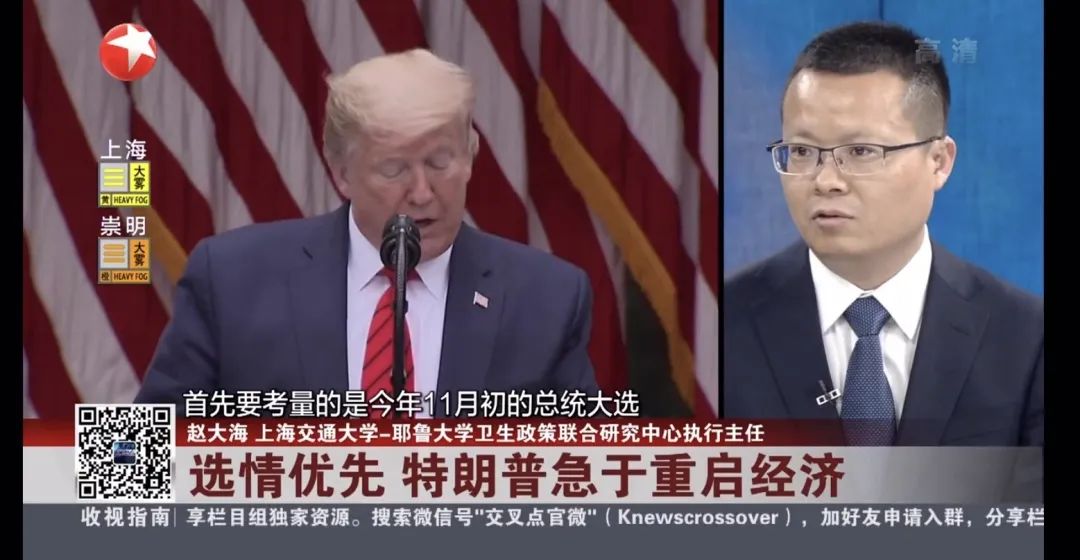
上海交通大学国际与公共事务学院博士生导师、上海交通大学-耶鲁大学卫生政策联合研究中心执行主任赵大海,对于新冠肺炎疫情暴发与防控第14次做客上海电视台演播室进行访谈评论,也是第32次在央视、上视进行访谈评论。在2020年5月17日上午9点的东方卫视《环球交叉点》节目,赵大海就美国经济重启对疫情的影响和中美关系等进行了解读和评论。演播室同期嘉宾是复旦大学国际问题研究院沈丁立教授。现将有关赵大海的访谈内容摘录如下。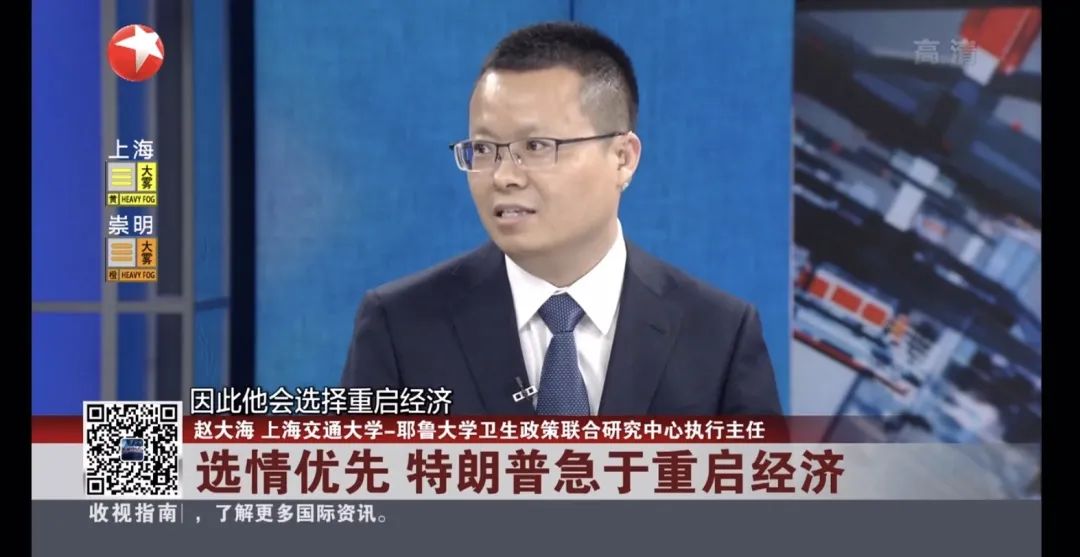
主持人:5月10号,我们现在看到美国已经有40多个州正在逐步的开放,甚至在一些商场、一些海滩都已经出现了人满为患的现象。可是,另一方面我们看到美国的这个疫情的数字非常不容乐观,140多万。在这样的情形下,特朗普政府坚决要求重开这个美国社会,重启美国。你觉得他的考量是什么?有没有道理?
赵大海:特朗普政府,包括特朗普本人,首先考量的是今年11月初的总统大选。为了保证他本人包括共和党在大选当中处于一个有利地位,因此他会选择重启经济。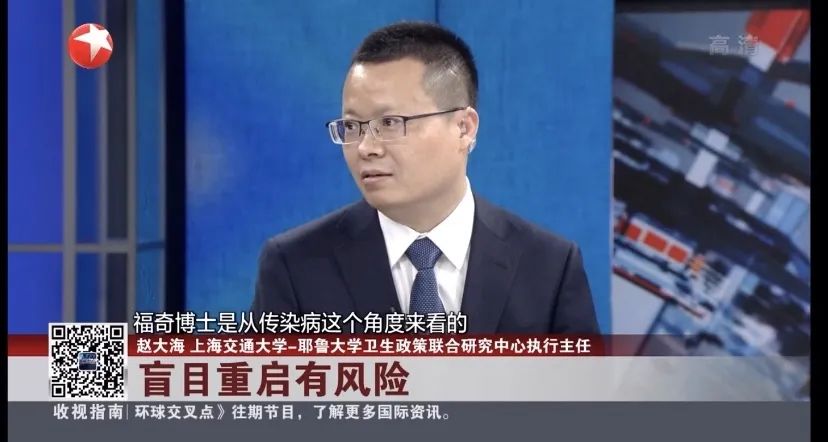
主持人:我们经常在媒体上看到这个美国的钟南山——福奇博士,他说,当各州重启之后,我们将在夏末的某个时间点看到新的疫情波浪将会越来越可怕,你觉得老人家多虑了吗?
赵大海:我完全赞同的是安东尼·福奇博士,从传染病这个角度来看,我们可以讲应该到今年的八月份,如果经济重启的话,确诊病例数会到1000万,包括白宫自己的这个文件也说每天新增确诊病例是20万左右。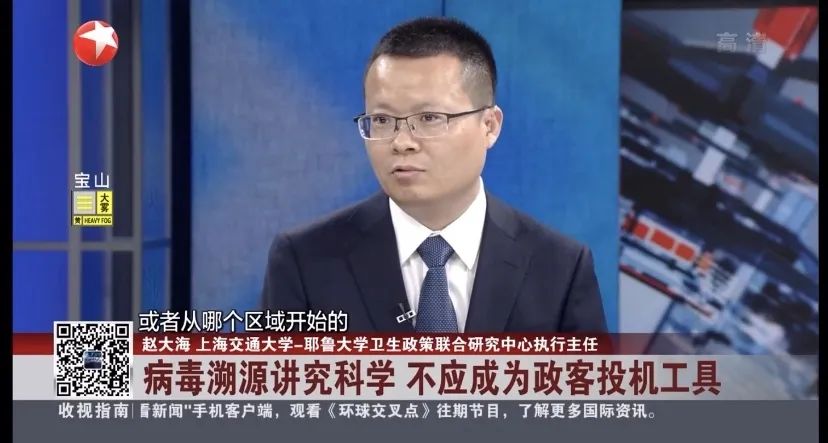
赵大海:对于病毒从哪个国家开始的,或者从哪个区域开始的,它原本是一个非常简单的科学问题,但是现在来看呢,他把原先的一个非常简单的一个医学科学问题转变成为一个政治问题。因为现在用这个中国病毒起源论,甚至污蔑是由这个武汉病毒所泄露所导致的。这样讲对于美国特朗普政府而言,就找到了非常好的一个借口来推卸自己责任。比如特朗普在3月9号在自己的社交软件里面提到的,美国现在只有22个死亡病例,完全没必要去去顾虑这个新冠肺炎,只是一个普通的流感而已。这样子就可以为特朗普政府带来一个很好的一个借口,然后把整个国内对他的怨言,对他这个领导的不力有了一个很好的转移矛盾的地方。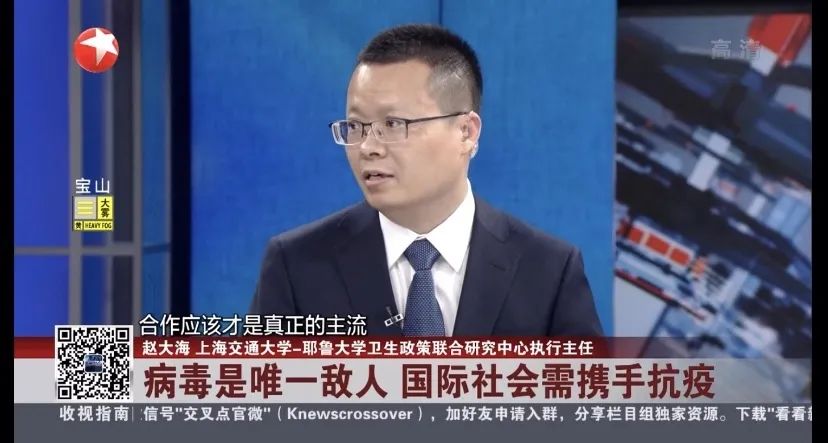
主持人:5月5号,中国驻美大使崔天凯在华盛顿邮报是发表了题目为《指责游戏应该结束了》的文章,那么紧接着在5月7号,他又发表了《携手冲破至暗时刻合作塑造后疫情时代》的讲话,他觉得在疫情肆虐的当下,不能由少数人的政治操弄,把中美两国拖入到这个冲突对抗和彼此消耗的境地,您怎么来解读崔大使的这个发声?
赵大海:我非常赞成这个崔天凯大使所倡导的,就是说中美关系合作应该才是真正的主流。现在被美国共和党的一小部分的这个政客,将这个整个合作的氛围变得方向不明确,甚至是比较灰暗的一个时期。那对于中国也好,美国也好,还其他世界各国也好,无论是政客还是普通的老百姓,应该非常清晰的认识到新冠肺炎这个病毒才是唯一的敌人。中国、美国,世界其他国家应该携手共同抗击疫情,其中包括普通的抗击,也包括这个特效药物的研制,也包括疫苗的研制。只有如此,才能防范未来重大公共卫生事件的发生。
供稿者:国务学院
日期:5月18日
Dahai Zhao' 32th comments on TV during the Pandemic: Trump Administration Has to Accept the Inevitable Consequences Facing Virus-hit Losses as Economic Restarting
Dahai Zhao, a doctoral supervisor at School of International and Public Affairs of Shanghai Jiao Tong University and Executive Director of Shanghai Jiao Tong University-Yale University Joint Research Center for Health Policy, has been interviewed by ShanghaiTV for the 14th time (the 32th time by CGTV / ShanghaiTV) since the COVID-19 pandemic. At 09:00 on May 17, 2020, Zhao commented on the impact of the US economic restarting and China-US relationship on “Global Intersections”.
Anchor: On May 10th more than 40 states were opening up in the US, and some malls and beaches were already overcrowded. However, on the other hand, we see the number of cases in the United States was not optimistic, more than 1.4 million. Under such circumstances, the Trump administration insisted on reopening the society and restarting the United States. What do you think his considerations were? Did that make sense?
Zhao: The Trump administration, including Mr. Trump himself, were looking ahead to the presidential election in early November. To ensure that he and the Republican Party were in a strong position in the election, he chose to restart the economy.
Anchor: We often see this American Dr. ZhONG Nanshan -- Anthony Fauci in the media. He said, “when the states restart, we will see at some point in the late summer that the new epidemic will become more and more terrible”. Do you think this people are worrying too much?
Zhao: I fully agree with Dr. Anthony Fauci. From an infectious disease perspective, if the economy were to restart, the number of confirmed cases could reach 10 million by August of this year, including a White House filing that puts the number of new confirmed cases at around 200,000 a day. Which country or region the virus started in was originally a very simple scientific question. But what began as a very simple medical science problem has now become a political one. Using the Chinese virus origin theory, even vilifying that the virus was leaked by Wuhan Virus Research Institution, is a very good excuse for the Trump administration to shirk its responsibility. For example, as Trump mentioned in his social media account on March 9, there were only 22 deaths in the United States. There was no need to worry about COVID-19. It was just a common flu. That would give the Trump administration a good excuse to deflect the country's complaints about his poor leadership.
Anchor: On May 5th CUI Tiankai, China's ambassador to America, has published an article in the Washington Post entitled "Ignoring the facts to blame China will only make things worse". Then, on May 7th, he delivered “Together to break the darkest hour and shape the post-epidemic era". He argues that in the midst of the epidemic, the politics of a few people cannot drag China and the United States into a state of conflict and mutual exhaustion. How do you interpret ambassador CUI’s statement?
Zhao: I highly agree with ambassador CUI Tiankai's proposal. China-US cooperation should be the mainstream. Now, because of the politician, a small part of the republican party in the United States, the whole atmosphere of cooperation has become unclear and even gloomy. For China, the United States, and the rest of the world, politicians and ordinary people alike, it should be clear that COVID-19 is the only enemy. China, the United States and the rest of the world should join hands to fight the epidemic, including the common fight, the development of this special drug and the development of a vaccine. Only in this way can we prevent the occurrence of major public health events in the future.
Contributor: SIPA, SJTU
Data: May 15

